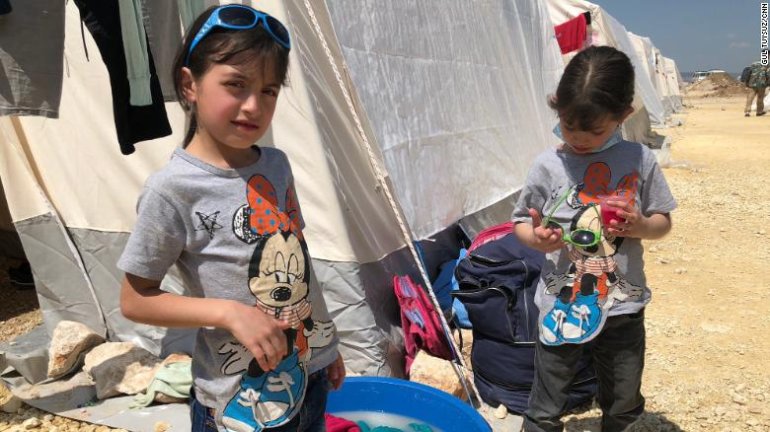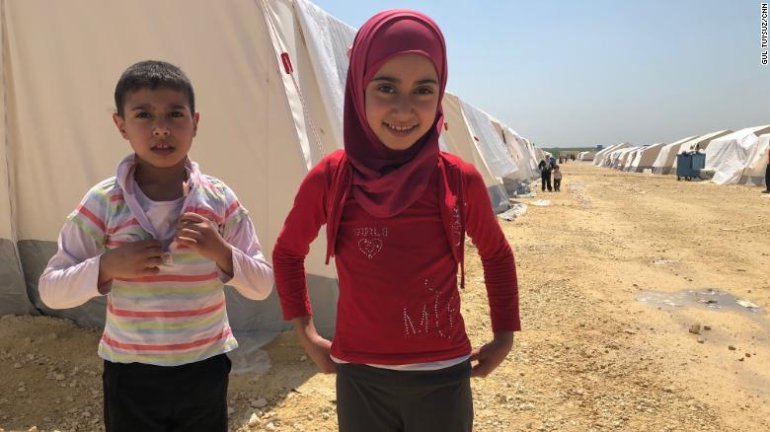The air in the camp is thick, fraught with the muted mourning of people who have been through more than they can comprehend, people whose losses penetrate their souls and whose fears are so great that they can barely express them.
These feelings are perhaps best described through the words of the children. After months of relentless bombardment drove them underground, just feeling the sunlight on their skin has become a luxury.
The al-Bol refugee camp in Aleppo province, tucked against the border with Turkey, is packed with hundreds of families who survived life under siege. They are from Douma, on the outskirts of Damascus, where an alleged chemical attack by the Syrian regime took place last Saturday. The town’s population had already seen its share of chemical attacks, barrel bombs, air and ground assaults over six years of besiegement by government forces.
Umm Nour shows us her twin seven-year-old girls with matching pink Dora the Explorer backpacks, which they insisted on not leaving behind when they left as part of evacuations earlier this week.

“They were two months old when the revolution began,” she says, referring to the popular uprising of March 2011, met by the brute force of the Syrian regime and later spiraling into civil war. “What have they seen in life, what do they know that is pure or kind? All they have seen is blood, dead, the wounded”
An acrid stench emerges from one of the backpacks as she unzips it, pulling out a small cardboard box.
One of the twins, Malaz, had packed away a little blonde doll.
“She spoke to the doll, telling her you might suffocate but you will be safe from the bombing,” Umm Nour remembers that her daughter’s voice was filled with sorrow.
For their last four months in Douma, the family lived in a basement. They were underground
when the toxic rounds hit.
“Someone yelled chemical” Umm Nour recalls. “I felt my throat close, my body go limp as if I had just had everything sucked out of me.”
She reenacts how her arms tensed up, how she could barely muster the strength to grab her daughters’ arms and claw her way up the stairs.
They made it to the fourth floor when artillery rounds or rockets — she’s not sure what –slammed into the building, shaking it.
“It was like we were between two deaths,” she says. “The chemical attack on the lower floors or the other strikes hitting the upper ones.”
The twins are a little shy. They smile sweetly and speak hesitantly.
“Imagine yesterday they were playing, they were digging a trench, a tunnel for the ants outside our tent,” Umm Nour says. “They told me it was so the ants could have a place to hide and stay safe if there was an attack,” she adds.

We were at the camp just hours after US, UK and French strikes hit three suspected regime chemical weapons site in response to the regime’s latest alleged toxic strike on Douma.
“What the Assad regime has done to us is a crime, he needs to be stopped,” Umm Nour says. “But what is most important is that civilians aren’t hurt. No one, no one should suffer what we did. There needs to be a political solution, an end.”
The twins say they want to be doctors so they can save wounded children.
The people here believe that the strikes were part of a broader political game, and had little regard for ending or easing their suffering. The intervention did little to eliminate the rest of Assad’s deadly arsenal, they point out.
It is a sentiment that has long existed among those who live in opposition-held areas, which have borne the brunt of regime bombardment over the years: that leaders who condemn the regime are hypocrites, merely feigning outrage to push forward their own agendas, and that Syrian lives have no real value to them.
“Let them hit Bashar, maybe it will save us,” 18-year-old Malak says cradling her four-month-old. Her voice is flat, muffled by despair, as if resigned to the idea that nothing can rescue them from their suffering.
She was underground when the chemical strike happened.
“When the smell hit us, we threw up. My mouth filled with phlegm. I couldn’t stop coughing,” she says almost matter-of-factly, as if being gassed while hiding out in a basement were routine. “We got to a clinic, where they dosed us with water and gave us oxygen.”
The baby, Malak’s other three-year-old child and her husband Walid were at her sister-in-law’s house — they spared the paralyzing fear the attack brought.
Walid was with one of the rebel fighting forces. He’s just 23. When the war broke out, he was 16-years-old, still in high school.
“I brought it with me,” he says showing us the key to his house. “Maybe one day we will be able to go back,” he tells us.
These are words that evoke refugees past, images of other populations who clung to the hope that one day their fate would change.
Amira, 10, laughs with some of her peers, but tugs at her sleeves when we talk to her. It’s her fourth day away from her home, a place robbed of happy memories.
“I was afraid,” she says shyly. She says she wants to be a teacher when she wants to grow up.
In the last seven years of Syria’s war, 68-year-old Farize has buried more relatives than she can remember, including her son and two grandsons.
Bent over at the waist, she hobbles through the camp aided by a cane and her 18-year-old grandson.
“I don’t miss home. I suffered too much in it,” she says quietly.
When we ask her about her favorite memory before the war, she can no longer suppress her pain.
“It’s the Fridays when the family would all get together, all my children and grandchildren. And everyone was alive.”
Her eyes well with tears she tries to cover. She looks up and begins to invite us for tea before the reality of her circumstances appears to set in. She doesn’t have a home.
Her instinctive hospitality is perhaps all she has left of the life she used to know.



























